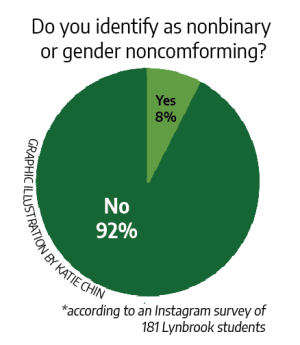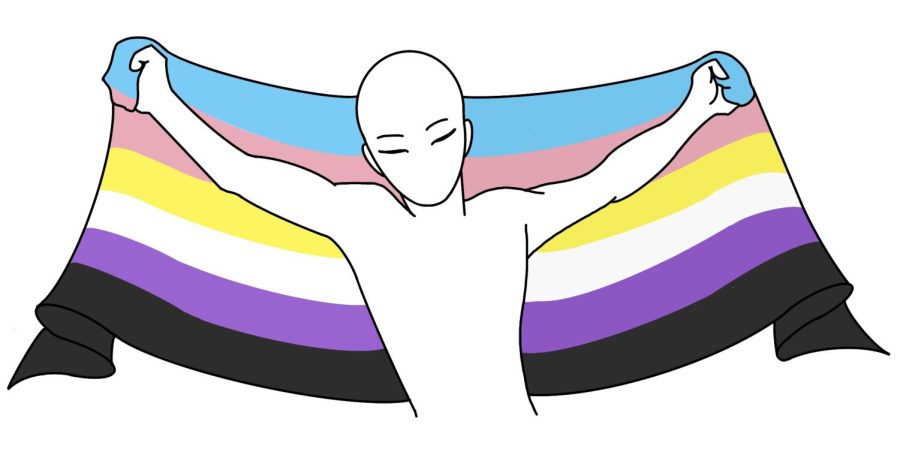Editorial: Take steps to affirm pronouns
Graphic illustration by Opinion Section
One of the best ways to support gender nonconforming students is by respecting pronouns and names.
April 5, 2022
Amid rising tensions surrounding Florida’s “Don’t Say Gay” Bill barring sexual and gender orientation topics from being discussed in schools, it is more important than ever to ensure that Lynbrook’s LGBTQ+ students feel supported on campus. The enforced binary of gender surrounds us: Marked bathroom stalls, separate sports teams and assumed pronouns are considered normal by most of society, but to the gender nonconforming, many of whom have struggled to realize, acknowledge and accept their diverging gender identities, the binary is not only uncomfortable, but also outdated and unreasonably exclusive. Seemingly harmless occurrences on campus can serve as reminders of a limiting gender binary that does not fully represent the diverse student body. One of the best ways to support gender nonconforming students is by respecting pronouns and names.
Rather than a binary, gender is a spectrum including the identities of male and female as well as anything in between or unrelated. Individuals who do not identify as their assigned gender at birth and are comfortable outwardly expressing it may use pronouns in agreement with their gender identity.
“There are a lot of times when it feels like a complete disconnect in the way the people around me perceive me versus how I perceive myself, but using my pronouns really helps,” said junior Nox Yeh, who uses they/he pronouns.

According to an Instagram survey conducted by the Epic with 181 responses, 8% of Lynbrook students use the pronouns they/them. Many students also use a combination of pronouns that reflect their identity, such as she/they, they/he or neopronouns, which are alternate pronouns such as ze/zir and xe/xem, and can be used by anyone, although commonly used among the transgender and neurodivergent communities. Many transgender and gender nonconforming students also use a name other than their legal name or birth name.
Not every gender nonconforming student has decided to make their gender public, to choose a label, or to share with peers and teachers how they identify. For those who are out, it can still be difficult asking others to respect pronouns and names they are not used to calling the student.
“It gets to a point where it’s a bit tiring to keep reminding people, so I just kind of let it slide,” said freshman Sarah Wei, who uses they/them pronouns.
Teachers can ease the process by asking students at the beginning of the year for their pronouns and if the name on the roll sheet is the correct one to use, but more importantly, making a sincere effort to remember. Some teachers have already started asking these questions; at the beginning of the school year, English teacher Anna Kirsh had her students fill out a Google Form that also asked whether students’ parents are aware, which is important to note for student safety.
Being mindful of students’ pronouns and names may take more effort initially, but it is well worth the comfort of students in their learning environment and will soon come naturally to teachers and peers alike. Being misgendered, or deadnamed, the colloquial term for being referred to by a legal or birth name in place of an asserted one, can be dysphoric for students and place a damper on mental wellbeing.
“It’s disrespectful and it can be damaging to one’s self esteem, one’s sense of safety and one’s sense of belonging, and the feeling of belonging is one of the most fundamental needs that we have,” said Monta Vista school-based therapist Leila Lurie, who is certified by RISE L.A., a program from the Los Angeles LGBT Center, in Sexual Orientation, Gender Identity and Expression.
Students whose names do not match their legal or birth name have long desired to make permanent reminders of the correct name to avoid misgendering. Printing asserted names next to legal ones in roll sheets, student ID cards and on Schoology are some examples presented by gender nonconforming students. FUHSD has begun the process of making it possible for students to change their names in Infinite Campus, which will assist students who are struggling with being deadnamed and asserting their name.
Jokes that make fun of neopronouns, such as putting them on par with outlandish alternatives like his/majesty, are sometimes told on campus with no regard for the fact that a student in the room could be gender nonconforming and not use their pronouns publicly. An ideal learning environment is one where all students feel safe to express themselves fully without fear of teasing or disrespect. In order to establish this, it is important to make campus accepting by refraining from such jokes and taking neopronouns seriously, so all students who desire to use them can feel supported.
“Your sense of safety, your sense of self and your sense of emotional wellness and stability are the foundations for being able to learn and think critically in the classroom,” Lurie said.
Furthermore, the support should not end at names and pronouns. Bathrooms, attire for senior pictures, and even the dress code are all defined by a gender binary and can be changed by diversifying the options available and the language used. The ongoing construction will result in a few more gender neutral bathrooms, but dressing options for PE and sports are still limited. Allowing students to change in the gender neutral bathrooms or including changing stalls within the locker rooms can be beneficial to students who are uncomfortable changing in the boys’ or girls’ locker rooms. ASB President-elect Sarah Sun has set out to fulfill another necessity by including menstrual products in both the girls’ and the gender neutral bathrooms in the next school year.
Gender nonconforming student athletes face the difficult reality that in order to play school sports, they must play for a team with an assigned gender that may not match their own.
“It’s dysphoric that there’s only two categories and the determining factor of whether you go into one or the other is your assigned gender at birth,” Yeh said.
Surrounded by mostly like-gendered teammates, it can become instinctual for many players and coaches to use the pronoun prescribed to the gender of the team, such as calling all members of a girls’ soccer team “she,” or all members of boys’ volleyball team “he.” Likewise, athletes are often grouped by gender; coaches give pep talks that start with “girls” or “boys,” and Lynbrook’s girls’ sports teams are often known as the “Lady Vikes.” Coeducational sports teams like cross country and track and field have adopted the term “secret pals” for the gift-giving tradition of secret sister, an example of encompassing terms that can be adopted across all sports teams. It may not be possible in the near future to reform the way sports teams are constructed, but using appropriate language is possible now.
In the current era of uncertainty in allyship, Lynbrook should follow the leads of Monta Vista and Cupertino and begin the process to become an OUT for Safe School, a program introduced by the Los Angeles LGBT Center that gives school administration comprehensive training to be visible allies and available support for LGBTQ+ students.
By breaking down societal boundaries and respecting everyone’s identity in order to accept them fully, Lynbrook can become a more inclusive and enriching community. High school encompasses some of the most transformative years of life, and having everyone feel safe and respected on campus will allow students to grow into themselves and have a positive high school experience.
*the Epic staff voted 36-0 in favor of this stance.




































































lib • Apr 24, 2022 at 5:13 pm
You will call me his/majesty or else I will cancel you!!!1!1!